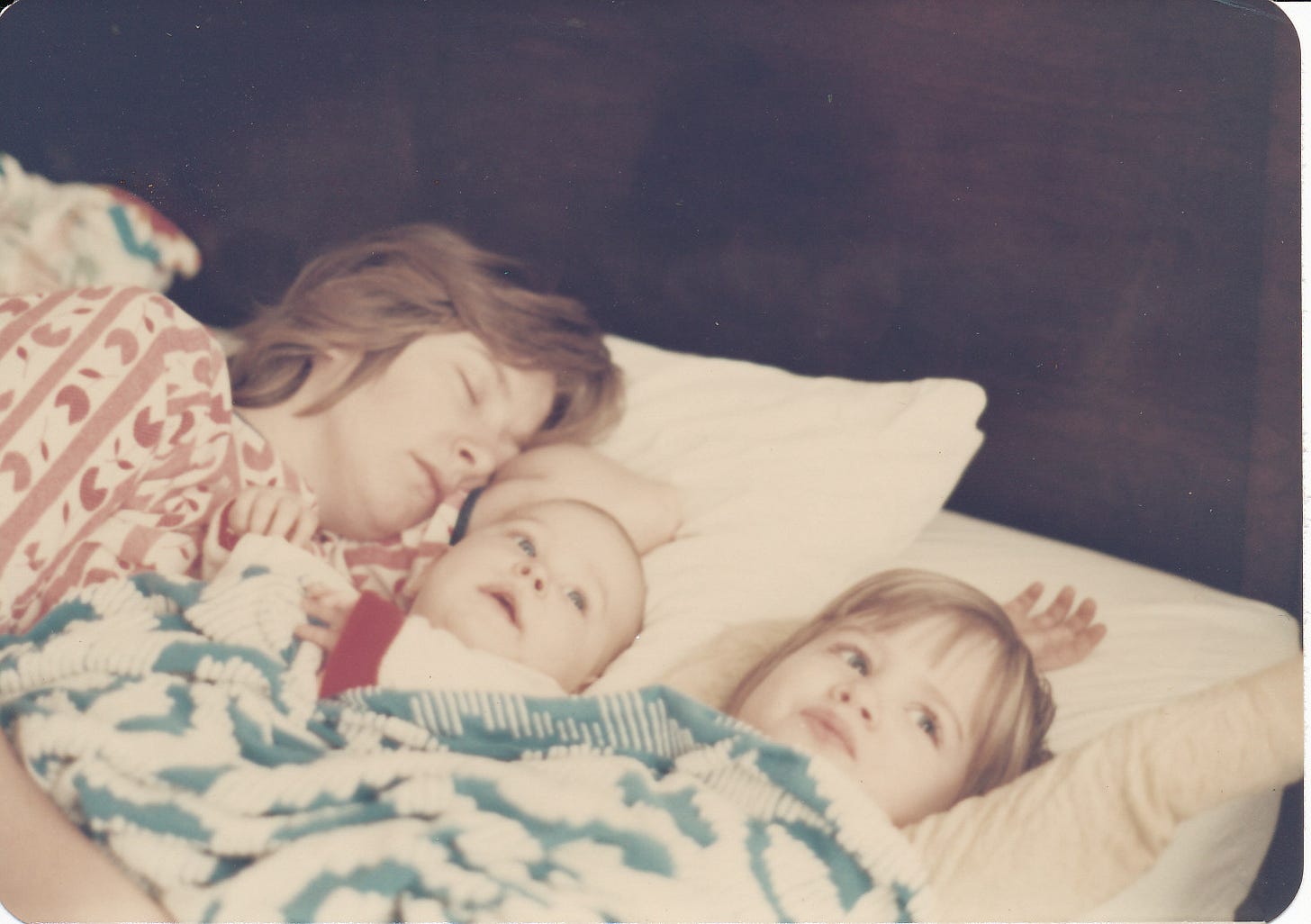Working third shift while pregnant
My mom worked third shift while pregnant with me in 1974. During the day she took care of my brothers. Pregnancy still doesn't get the respect and consideration it deserves.
It’s 1974 and my mom’s pregnant with me, resting in a vinyl covered recliner. During the day she took care of my older brothers and babysat kids in the neighborhood. After my dad came home from work at JCPenney, she’d go to bed, getting sleep before her third shift job as a key punch operator. That’s if she was able to sleep through the noise, resisting the urge to get up and help.
Wondering what a key punch operator did?
I always knew that story, but recently my mom told me more details about her data entry job. She worked alone in an office, in a strip mall on a busy street next to a 7-Eleven.
No shades or curtains, anyone passing by could see Mom through the big picture window, while she sat alone in the empty office, punching holes in paper cards. She worked nights throughout the pregnancy, and then went back after a short unpaid “break.”
Ever since she told me that I can’t help but wonder: Is that why I’m hypervigilant? But my bigger question is: Why on earth did she have to do that?
And yeah, at that time it was “have to.” My dad’s paycheck didn’t cover essentials for a full pay period. Years later, she’s still paying a heavy toll as all that overwork is showing up in her aging body.
I kind of think now it would’ve been better if they moved somewhere where rents were less. But employment options were limited. Dad got the JCPenney job he had through an employment agency that charged him an entire month’s salary, due within the first year of work—a standard practice at the time.
Being pregnant is harder than it needs to be—for some people
I know so many women face a similar dilemma to my mom. In contrast, I had very privileged pregnancies. When I reached a point where my job felt like a stress on my body, I resigned. I had no medical proof that I wasn’t able bodied enough to work; no legal definition of a “pregnancy-related condition.”
But I knew if it didn’t feel good to sit confined to a chair or stand in one place for hours at a time, then it probably wasn’t good for my baby. And I was able to make that decision for myself because my career was flexible and my partner’s income was able to support us.
I’m grateful we could get by with me taking unpaid time off late in pregnancy, because having some moments of quiet, still time helped me feel ready for the birth post-partum period. And I’m kind of glad I didn’t have the WFH option then, because I’m pretty sure I never would’ve taken the time off even if it was a choice I could make. Still, it's a personal decision everyone deserves to have.
It’s great that paid parental leave is expanding, maybe through a federal law too. But why isn’t pregnancy an extra part of parental leave? Why do people have to choose between pushing through that final stretch of pregnancy or losing time off after the baby’s born?
I don’t know if my mom working nights under stress while she was pregnant with me caused me to end up more anxious. But we know how a mother’s wellbeing during pregnancy shapes outcomes – for herself, her baby and maybe generations.
Pregnancy deserves more respect and consideration than it gets.
So You Became a Mom
As soon as I became pregnant, I felt my boundaries dissolved by the baby growing inside me. And in other ways too. I felt more connected to anyone who’s ever been pregnant. And I felt like I needed others in a way that I hadn’t since I was a kid.
It’s one thing to feel that way in your own body, but it’s another when others assume they can overstep your boundaries because you’re pregnant. Touching your belly. Telling you that you look like you’re about to pop. Asking you when you’re due. Or if your baby’s “healthy.”
My late '90s choice: Have a baby now or wait? Whose body is it anyway?
In December 1998, I was about to graduate from pharmacy school, and we were about to move to Kansas where I accepted a PhD fellowship in Medicinal Chemistry. But as the weeks drew closer, I started feeling twinges of loss for a baby I hadn’t yet had and told myself I didn’t want any time soon. I felt her in my arms. I saw her tiny pink embroidered onesies with Peter Pan collars at stores, the kind that would never get worn. I heard her tiny, helpless cries (not the banshee-sounding kind tiny babies actually make).
Why is this happening now? I’d been telling myself for years, “I ain’t no baby machine”—literally writing this note-to-self in my teenage diary. I was the first woman in my family to go to college and wanted to follow the “smart” woman’s rules for success: No baby before thirty. No more than two. And no large gap—in babies OR career.









